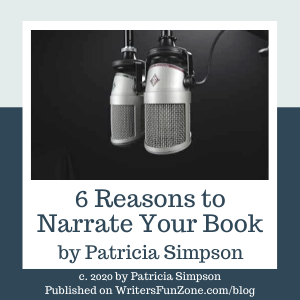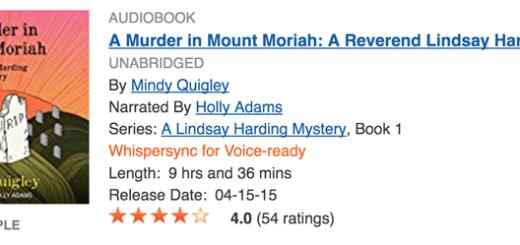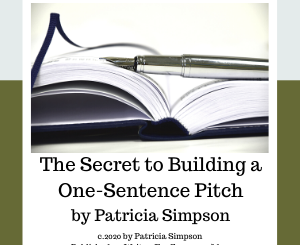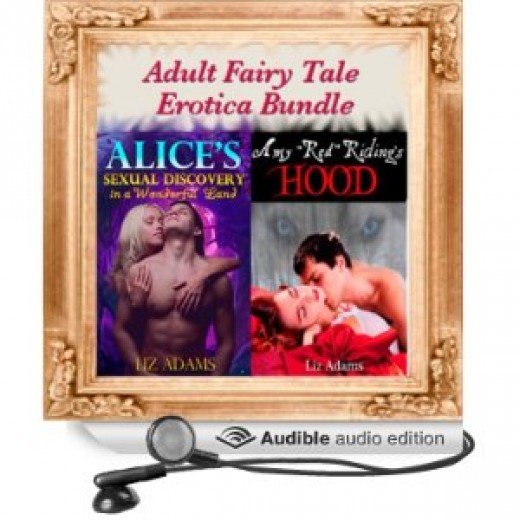6 Reasons to Narrate Your Book by Patricia Simpson
 Today we welcome a new guest writer to Writer’s Fun Zone, Patricia Simpson who is stopping by to chat with us about “6 Reasons to Narrate Your Book.” Enjoy!
Today we welcome a new guest writer to Writer’s Fun Zone, Patricia Simpson who is stopping by to chat with us about “6 Reasons to Narrate Your Book.” Enjoy!
***
You’re an indie author. Your critique group and beta readers have scrutinized your chapters and cover. You have made final changes and are ready to publish. Right? Wrong. Make an audiobook first. Here are the reasons why you may want to narrate your book.
6 Reasons Why to Narrate Your Book
1. The ear hears what the eye skips over.
In this day of digital media, we have grown accustomed to skimming for information. We scan paragraphs for salient points and move on. Our eyes are designed to do this.
Most of us can read words whose letters are jumbled almost as easily as if the letters were in the correct order. Understanding at a glance is a skill.
Our skimming skill isn’t that great for editing. My eyes will gloss right over “the” next to “the,” especially if there’s a line break between them.
Yet if I’m reading the manuscript out loud, I’m using my brain in a different way.
When reading as a narrator, the brain knows it has to quit scanning, pay attention to what the mouth is saying and the ear is hearing and take the time to understand and pronounce every word.
2. Narration catches convoluted writing.
Sometimes, after numerous rewrites, we can overwork a paragraph until it reads like a James Joyce novel.
Long, convoluted sentences can lose your reader and force them to backtrack, just to understand what you are trying to say. The horror.
You don’t realize how convoluted the writing is, because you’ve read it so many times you could probably recite it by heart.
When you read your book out loud, however, your voiceover actor self will experience the same confusion a reader experiences.
- What’s the subject?
- Where does the emphasis belong?
- Why would you want to make a reader work that hard?
When you read your book out loud, your ear will catch convoluted passages as you encounter them.
You will stumble over convolutions your eye has skimmed over; granted, it is stellar prose—and who wouldn’t award you the Booker Prize for the turn of phrase that was just so perfect, so golden, you just have to keep it in because it reads so wonderfully, especially since there is a semi-colon, colon and an em dash or maybe even some parentheses—because, really, writing novels can show off a person’s genius (and phraseology) as no other medium.
K.I.S.S.* (Keep it simple, Steinbeck!)
3. Narration catches overuse of adverbs.
Most writers know the less adverbs they use, the better their text flows.
Adverbs can really slow down a sentence. But those pesky adverbs crop up, no matter how vigilant we are.
If you read your book out loud, you will catch a lot of extra adverbs, because they are often difficult to pronounce in a sentence. (At least for me.) Try saying this phrase three times:
“…feeling peculiarly safe with him…”
Even if your tongue didn’t just fall back into your throat, try recording what you just said. Listen to it. The clip will probably sound like you’re yodeling.
Drop the adverb if the sentence doesn’t require it. It rarely does.
4. Audio playback finds plot holes.
A book takes a long time to create. Sometimes years.
Over time, even the best of writers can forget details from Chapter 1 to Chapter 40.
Years may have gone by since you mentioned the red spoon in Chapter 1. How did it become green in Chapter 40? If you read your book cover to cover, you might catch the spoon mistake. But again, your eye is trained to understand on the fly. And it’s moving fast.
According to Wikipedia, the average adult reads text at 250 to 300 words per minute.
Narration is done at 150 to 160 words per minute. So your mouth is going twice as slow as your eyes. And those eyes will gloss over so much. There’s something about the brain to eye connection that is totally different than the brain to ear connection. (At least for me.)
If I take that same book and listen to the audio track, I have a totally different experience. I’m not reading text, fingers poised to go to the next page. I am IN the book, IN the world.
My ears engage my brain and keep it inside the story instead of streaking forward with the eyes. I am usually amazed at the details I find to fix in the text. Or things I’ve said too many times. Or things I’ve renamed.
In the old days, a good editor caught many such errors. But the last editor I had was too busy to care as much as she should. I was amazed at the errors that got through a traditional publisher. So now, I do line edits myself, using audio. But it’s worth it. Editing for the ear has made me a much better writer.
In fact, as I edit the audio, I keep my Word document open so I can alter my text as I go. Then both audiobook and manuscript are exactly the same.
5. You know how you want things said.
Have you ever watched a movie and thought the actor emphasized the wrong word? They completely missed the punch of the sentence. The timing. The irony.
That can happen if a narrator doesn’t understand your meaning or your sense of humor. I’m not saying narrators can’t read books well.
There are wonderful narrators out there. I’m saying that you are the person who knows how to best interpret your prose.
6. Readers want to read along or multitask.
I met an avid reader the other day who said they love to read but have trouble staying on task. They lose their concentration and their place in the book. But if they listen as they read along, they stay in the book. (Again, that ear/brain connection.)
So if they buy a book, they ALWAYS buy the audiobook, too. That was a revelation to me.
Audiobooks are time-consuming to make, but the profit on them is much larger than a book sale. If there are more people like Kelly out there wanting to buy both versions of your book, you should make the audiobook available to them. More sales!
Plus, more and more people are jogging, cleaning and driving while listening to books and podcasts.
I predict the audiobook market will one day be as popular as the text market. Why not reap the benefits of this growing market and improve your writing at the same time?
For details on how I narrate a book, please read my blog post, DIY Audiobooks
Listen to an audio sample of Patricia Simpson’s latest book, Apothecary.
***
About The Author
 Patricia Simpson has won numerous awards, including Romantic Times Career Achievement Award, Best Futuristic, Paranormal, Fantasy of the Year and Reviewer’s Choice Awards. One of her recent novels, SPELLBOUND, was nominated Best Indie Paranormal of the Year.
Patricia Simpson has won numerous awards, including Romantic Times Career Achievement Award, Best Futuristic, Paranormal, Fantasy of the Year and Reviewer’s Choice Awards. One of her recent novels, SPELLBOUND, was nominated Best Indie Paranormal of the Year.
Visit Patricia Simpson’s website at https://patriciasimpson.com.
This article first appeared on Patricia’s site here: https://patriciasimpson.com/6-reasons-for-narrating-your-book






